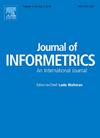通过国家支持促进科学发展:亚美尼亚国家拨款作为科学和国际进步的驱动力
IF 3.5
2区 管理学
Q2 COMPUTER SCIENCE, INTERDISCIPLINARY APPLICATIONS
引用次数: 0
摘要
苏联解体后,亚美尼亚面临着严峻的转型,这深刻影响了其科学基础设施。在苏联解体后,亚美尼亚科学景观的演变发生在一个面临重大挑战的时期,包括资金减少、“人才流失”以及从苏联时代的科学优先事项转移。作为回应,亚美尼亚政府实施了改革,以振兴科学界,特别是在2007年建立了国家科学委员会,并引入了竞争性研究资助计划。该研究分析了亚美尼亚国家研究补助金的数量和趋势及其对科学进步的影响。亚美尼亚科学与全球标准的一致性和学术产出的可见性利用科学网(WOS)数据库进行定量分析。主要目标包括评估研究资助的动态,确定跨学术领域的成功项目,以及探索对年轻学者职业前景的影响。研究结果揭示了这些资助对亚美尼亚研究的质量和国际化的变革性影响,提供了对国家竞争性资助在培养可持续和创新科学环境中的作用的见解。本文章由计算机程序翻译,如有差异,请以英文原文为准。
Boosting science through state support: Armenian state grants as a driver of scientific and international advancement
After the Soviet Union's dissolution, Armenia faced a rigorous transition that profoundly affected its scientific infrastructure. The evolution of Armenia's scientific landscape following the collapse of the Soviet Union, has taken place during a period marked by significant challenges including reduced funding, a "brain drain," and a shift away from Soviet-era scientific priorities. In response, the Armenian government has implemented reforms to revitalize the scientific community, notably by establishing the State Science Committee in 2007 and introducing competitive research grant programs. The study analyzes the volume and trends of state research grants and their impact on scientific advancement in Armenia. The alignment of Armenian science with global standards and the visibility of scholarly output were assessed utilizing the Web of Science (WOS) database for quantitative analysis. Key objectives include evaluating the dynamics of research grants, identifying successful programs across academic fields, and exploring the implications for young scholars' career prospects. Findings reveal the transformative effects of these grants on both the quality and internationalization of Armenian research, providing insights into the role of state competitive funding in fostering a sustainable and innovative scientific environment.
求助全文
通过发布文献求助,成功后即可免费获取论文全文。
去求助
来源期刊

Journal of Informetrics
Social Sciences-Library and Information Sciences
CiteScore
6.40
自引率
16.20%
发文量
95
期刊介绍:
Journal of Informetrics (JOI) publishes rigorous high-quality research on quantitative aspects of information science. The main focus of the journal is on topics in bibliometrics, scientometrics, webometrics, patentometrics, altmetrics and research evaluation. Contributions studying informetric problems using methods from other quantitative fields, such as mathematics, statistics, computer science, economics and econometrics, and network science, are especially encouraged. JOI publishes both theoretical and empirical work. In general, case studies, for instance a bibliometric analysis focusing on a specific research field or a specific country, are not considered suitable for publication in JOI, unless they contain innovative methodological elements.
 求助内容:
求助内容: 应助结果提醒方式:
应助结果提醒方式:


